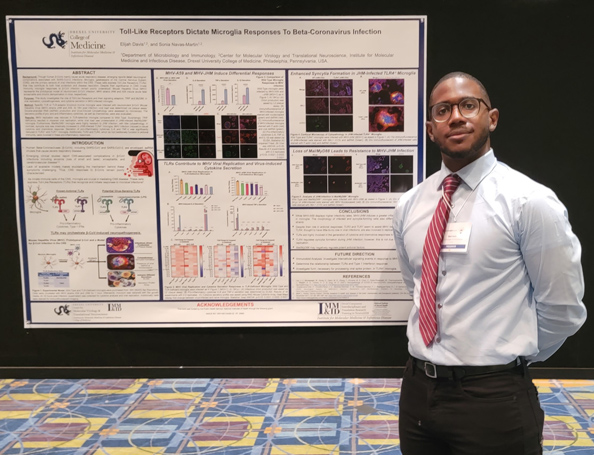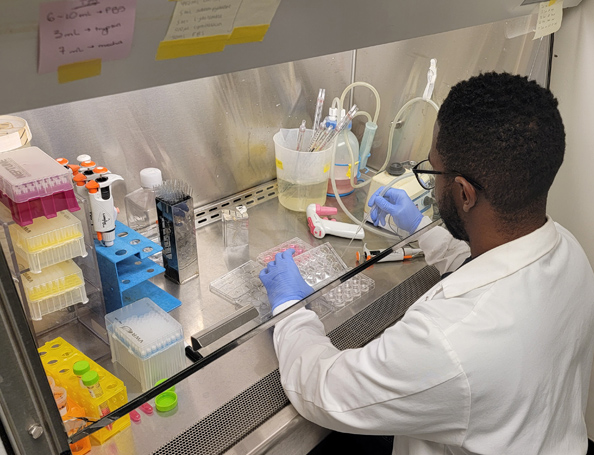Meet Elijah Davis
MI Program Class of 2023-2024

Hometown: Bowie, Maryland
Undergraduate: Major – Biological Sciences, Minor – Psychology - University of Maryland, Baltimore County
Tell me a bit about yourself prior to your time in school at the College of Medicine.
I am a Maryland native who completed his undergraduate studies at the University of Maryland, Baltimore County. I initially entered UMBC determined to solely pursue biological sciences; however, I was constantly enthralled by classes that delved into the mind. I then decided to minor in psychology, though this decision wouldn’t bear fruit until later in my career. While at UMBC, I strove to excel in my classes while engaging in extracurricular activities. My time as vice president of UMBC’s crew team remains a personal highlight. I enjoyed watching the team come together to support one another in both our victories and defeats. I also retained my competitive nature from years of high school rowing. During my junior year, I had the opportunity to study Lupus at the National Institutes of Health. This internship combined hands-on clinical training with bench research, emphasizing the human element of scientific research. My experience here instilled a desire to make discoveries that not only enhance the lives of others but allows non-scientists to better understand the world around them.
In my senior year, I decided to focus on becoming a stronger candidate for PhD programs instead of applying directly to graduate school. This led me to Virginia Commonwealth University’s Post-Baccalaureate Research Education Program (PREP). Over the course of a year, I conducted grant-funded research and attended graduate level courses in order to better prepare myself for the rigors of doctoral studies. I was able to present my work at the annual biomedical research conference for minority students (ABRCMS) and publish in a peer-reviewed journal. After completing VCU PREP, I felt more than ready to tackle the challenges of grad school.

What drew you to your current field of study, microbiology and immunology, and to the College of Medicine specifically?
I’ve always been fascinated by the various means and mechanisms our bodies use to fend off external and internal threats. As a child, I would collect small creatures and expose them to whatever I could find (toothpaste, cleaning supplies, etc.) to see how they would react. As I got older, various works such as Scott Sigler’s novel Infection and medical dramas such as House, M.D. further influenced this interest. It was the middle school summers spent with my aunt, Cynthia Price, that truly set me on the path I walk today. She’s an emergency medicine physician at Hartford Hospital who always brought me into work. I spent my time listening to her colleagues discuss the various diseases they’ve treated, and the long-lasting consequences illnesses can have. Hearing firsthand accounts of their battles with rampant pathogens and dysregulated immune functions opened my eyes to the world of immunology. They were always ready to answer my questions, regale me with stories and provide general explanations of the work they do. It was during this time that my curiosity evolved into a passionate drive to understand the world of microbiology and host-pathogen interactions. I knew that I wanted to conduct impactful research that shed light on unsolved questions of the world. That is exactly what I found at Drexel University College of Medicine. The studies here range from microbiology to pharmacology and include everything in between. It was evident to me that this was the place to be for high-quality research. Furthermore, Drexel’s commitment to diversity was apparent during my interviews. It was clear that while graduate school is challenging, DUCOM provides numerous resources for minority students. I believed that here, I’d find a supportive and resourceful community.
What work have you done in the Navas-Martin Lab? What have you learned from your time doing that work?
Our research within the Navas-Martin Lab primarily focuses on innate immunology; however, we have several broad-ranging secondary interests as well. One such interest is elucidating host-pathogen interactions within the central nervous system (CNS). My research mainly falls under this area and examines the role microglia, gatekeepers of the CNS, play in neurological disease. I’ve studied how these immune cells communicate with nearby populations by releasing extracellular vesicles that contain fine-tuned instructions, which are key to maintaining proper brain functions. Another project examines how certain viruses may be able to infect microglia and spread in a manner that evades the immune system’s defenses, allowing them to replicate unmolested.
If I’ve learned anything from my time in the Navas-Martin Lab, it’s that one shouldn’t be afraid to question dogma and seek out-of-box, unconventional lines of thinking. Pathogens are constantly adapting to the world around them, and so our views should be able to shift and flex as well. This isn’t to say we should ignore established principles, rather that we should ask what has and hasn’t been considered. Perhaps an infectious agent has found a way to circumvent certain pathways. It’s okay to be incorrect, as long as you remain resilient in your pursuits. There will be setbacks and failures, that’s the nature of science. I’ve learned to not be disheartened in these instances. Glean what you can from these challenges, then use that knowledge to attack the problem anew.

What research are you engaged in at present?
I’m currently investigating how a family of proteins called toll-like receptors (TLRs) allows immune cells to recognize and respond to viral infections within the brain. TLRs initiate powerful responses to eliminate pathogens; however, they may also play a role in neuroinflammation, which can result in neurological complications. It’s crucial to understand how these immune sensors dictate the brain’s response to viral infection, as well as examine how these pathogens circumvent, or even co-opt, these pathways. My research utilizes mouse-specific beta-coronavirus strains, which are viewed as the prototypical model of neurovirulence. We are looking to expand these studies to human beta-coronaviruses, such as SARS-CoV-2 and others that have had a drastic impact on global health.
Your research interests include autoimmune disease, hypersensitivity disorders and neuroinflammation. What drew you to these topics?
We’re often taught that the immune system defends the body from harm, but what happens when the immune system itself becomes a threat? Autoimmune disease, hypersensitivities and uncontrolled inflammation can occur when our bodies overreact to perceived dangers. These conditions drastically impact the lives of those afflicted with them. While cutting-edge clinical treatments are available, advances in therapeutics will only come with a better understanding of these ailments. The immune system can be a double-edged sword and exploring this aspect of immunology is an extremely complex, yet fascinating, challenge. Throughout my scientific career, I’ve had the chance to conduct research in each of these areas. Despite my contributions, I left each experience with more questions than answers. These riddles push me to continue my investigations, in the hope that my research will provide valuable and actionable insights into these disorders.
You're part of the Committee of Diversity and Inclusive Excellence for the College of Medicine. Why are you passionate about that work?
At every step and milestone, my scientific journey has been deeply influenced by my status as an African-American man. As such, I wouldn’t be where I am today without the assistance of programs dedicated to enhancing the experiences of minorities in STEM. The resources and support provided by these groups are invaluable. It’s amazing to see so many individuals from various departments come together and think of ways to foster diversity here at Drexel. As these groups have aided me in my journey, I firmly believe in assisting other underrepresented communities in theirs. I want to help those who are facing the same challenges I struggle with. Moreover, I want to create an environment that understands the current climate and offers resources students can use to thrive, not just survive. That’s why I’ve joined the Committee of Diversity and Inclusive Excellence. I may not be a program director or chair any boards yet, but I’m active in several minority-centered groups throughout Drexel. These include Drexel’s Black Graduate Student Union (DBGSU), Drexel’s Bridge to the Doctorate Fellowship (BTD), and the Institute for Molecular Medicine's Center for Science Communication and Outreach Program. By bringing awareness of these groups, their mission, and their resources to the committee, I aim to create a support network that spans across Drexel’s multiple campuses and disciplines. In doing so, we establish a continuous cycle of uplifting students who, in return, uplift others.
What advice would you give to people considering doctoral studies in microbiology and immunology?
If you have any interest in pursuing studies in microbiology and immunology, then you and your ideas are welcomed. Sometimes, the need to succeed can often be overwhelming. One may see failures as reasons why they might not belong. You are not defined by your setbacks, however. Be resilient in your drive, yet flexible in your approach. Looking at a problem from a new perspective can be all that’s needed to jumpstart your work. Secondly, community is key for both scientific research and mental health. Scientists should not work alone. Find groups of like-minded individuals you can both share your successes with and ask for support when things are tough. You never know who may provide the spark of inspiration that renews your will to persevere.